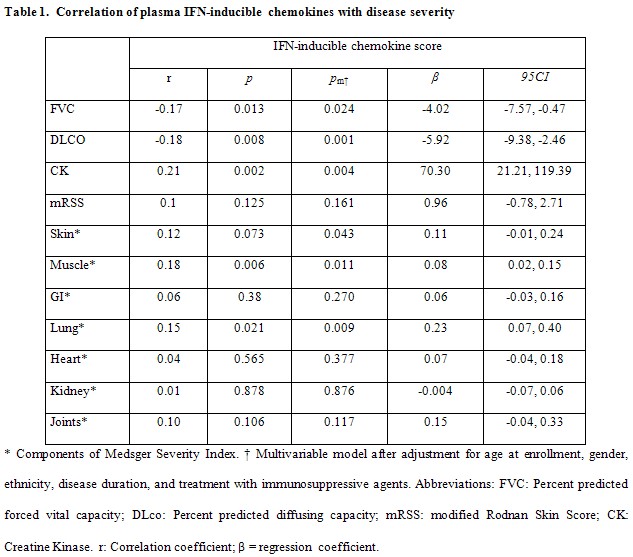Session Information
Session Type: Abstract Submissions (ACR)
Plasma Interferon Inducible Chemokine Score: Stable Marker of Disease Severity in Systemic Sclerosis
ABSTRACT:
Background/Purpose: The most prominent gene expression profile in the peripheral blood of patients with systemic sclerosis (SSc) is an interferon (IFN) inducible signature. A large scale correlation of this signature with disease subtypes and features has not been performed due to scarcity of RNA samples. Herein, we identify plasma chemokines that correlate strongly with the IFN gene signature and investigate their correlation with disease features in a large early SSc cohort.
Methods: We examined the correlation of IFNγ-inducible protein-10 (IP-10/CXCL10), IFN-inducible T cell alpha chemoattractant (I-TAC/CXCL11), and monocyte chemoattractant protein-1 (MCP-1/CCL2) with the IFN gene expression signature. We generated an IFN-inducible chemokine score with the correlated chemokines, IP-10 and I-TAC, and compared it in 266 patients enrolled in the GENISOS cohort (disease duration<5 years, 59% diffuse cutaneous involvement) to that of 97 matched controls. Subsequently, the correlation between the baseline chemokine score and markers of disease severity was assessed. Finally, the course of chemokine score over time was examined in 63 follow-up plasma samples prospectively.
Results: The plasma IFN-inducible chemokine score highly correlated with the IFN-inducible gene expression signature (rs=0.612, p=0.0015) and was significantly higher in SSc patients than matched controls (p<0.001). When the chemokine level was dichotomized based on the 95th percentile level in unaffected controls, 39.2% of patients had a positive chemokine score, which is more prevalent than any SSc-related autoantibody. Furthermore, the chemokine score was associated with the presence of anti–U1 ribonucleoprotein antibodies (RNP) (p<0.001) and absence of anti–RNA polymerase III antibodies (p=0.002), but not disease duration, disease type, or other autoantibodies. As shown in Table 1, the chemokine score correlated with the concomitantly obtained muscle, skin and lung components of the Medsger Severity Index, as well as, FVC, DLco, creatine kinase independent of anti-RNP or other potential confounders (age, gender, ethnicity, disease duration, and treatment with immunosuppressive agents). Finally, there were no significant changes in the chemokine scores over time while their baseline levels correlated significantly with those on the follow-up visits (r=0.39, p=0.002). This indicates that the chemokine score is a stable marker of disease severity and does not fluctuate in a consistent time-dependent manner.
Conclusion: The IFN-inducible chemokine score is a stable marker of more severe subtype of SSc. This composite score may be useful for risk stratification regardless of disease type, serology or duration. It also might identify the subgroup of patients that benefit from treatments targeting IFN pathways.
Disclosure:
X. Liu,
None;
M. D. Mayes,
None;
F. K. Tan,
None;
M. Wu,
None;
J. D. Reveille,
None;
B. E. Harper,
None;
H. T. Draeger,
None;
E. B. Gonzalez,
None;
S. Assassi,
None.
« Back to 2012 ACR/ARHP Annual Meeting
ACR Meeting Abstracts - https://acrabstracts.org/abstract/interferon-inducible-chemokines-correlate-with-disease-severity-in-systemic-sclerosis/

